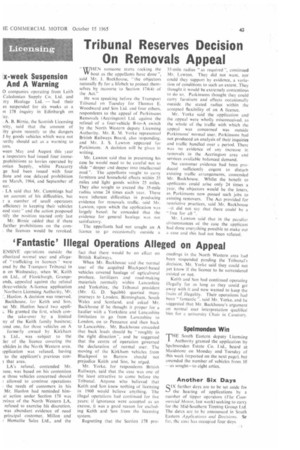Tribunal Reserves Decision On Removals Appeal
Page 45

If you've noticed an error in this article please click here to report it so we can fix it.
" W/H.EN someone starts rocking the VI' boat as the appellants have done ", said Mr. J. Backhouse, " the objectors naturally fly for a lifebeit to protect themselves by recourse to Section 174(4.1 of the Act."
He was speaking before the Transport Tribunal on Tuesday for Thomas E. Woodward and Son Ltd. and four others, respondents to the appeal or Parkinsons Removals (Accrington) Ltd. against the refusal of a four-vehicle B-to-A switch by the North Western deputy Licensing Authority. Mr. R. M. Yorke represented British Railways Board, also responding, and Mr. J. S. Lawton appeared for Parkinsons. A decision will he given in writing.
Mr. Lawton said that in presenting his case he would need to be careful not to slide "deeper and deeper into intellectual mud". The appellants sought to carry furniture and household effects within 35 miles and light goods within 25 miles. They also sought to exceed the 35-mile radius some 24 times each year. There were inherent difficulties in producing evidence for removals traffic. said Mr. Lawton, upon which the application was largely based: he conceded that the evidence for general haulage was not satisfactory.
The appellants had not sought an A licence to go occasionally outside a 35-mile radius "as required ", continued Mr. Lawton. They did not want, nor could they support by evidence, a variation of conditions to such an extent. They thought it would be extremely contentious to do so. Parkinsons thought they could carry furniture and effects occasionally outside the stated radius within the accepted flexibility of an A licence.
Mr. Yorke said the application and the appeal were wholly misconceived, as the whole of the traffic with which the appeal was concerned was outside Parkinsons' normal user. Parkinsons had not produced an analysis of their inquiries and traffic handled over a period. There was no evidence of any increase in removals in the Accrington area and services available balanced demand.
No customer evidence had been produced sufficiently cogent to disturb existing traffic arrangements, contended Mr. Backhouse. Whilst the benefit to applicants could arise only 24 times a year, the objectors would be the losers. as Parkinsons now passed such jobs to existing removers. The Act provided for restrictive practices, said Mr. Backhouse –it did not say that there could be a " free for all ".
Mr. Lawton said that in the peculiar circumstances of the case the applicant had done everything possible to make'out a ease and this had not been refuted.








































































































































